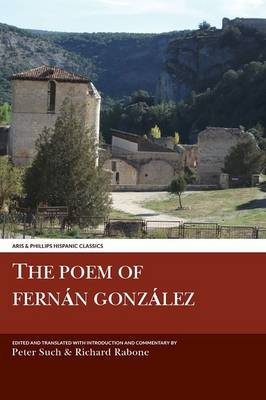
The Poem of Fernan Gonzalez
Aris & Phillips Ltd (Verlag)
978-1-910572-00-9 (ISBN)
Fernan Gonzalez lived from about AD 910 to 970. The popular image of him is of a fearsome warrior who gave his people protection from their enemies (both Muslim and Christian), and a wise and respected lord who enabled them to live in security and harmony. He was generally accepted to have played a strategic role in achieving independence for Castile and freeing it from dominance by the kingdom of Leon.
The Poema de Fernan Gonzalez was composed (by an unknown author) in the mid-thirteenth century as an enduring celebration of his triumphs and account of his life and deeds. Fact and legend have become intertwined and there is much within its stanzas that is certainly not closely based on historic facts! This new translation is set against a detailed study of the historic context of the Castillian conflicts and a factual account of the life and achievements of Fernan Gonzalez. The political situation of the time in which the poem was composed is also considered, as is the manner in which the‘history' it espouses came to be handed down over three centuries, the possibility of a pre-existing rich oral tradition surrounding this iconic figure, and the possible sources employed by the poet in constructing the poem.
Peter Such was Head of Modern Languages and Director of the International Baccalaureate Diploma Programme at Sherborne School. He is the author (with John Hodgkinson) of The Poem of My Cid and (with Richard Rabone) of Book of Alexander. He retired from teaching in 2011 and he now lives in the province of Córdoba, working as an educational consultant and translator. He continues to carry out research on the literature of thirteenth-century Castile and its political and intellectual background. Richard Rabone is a member of Merton College, Oxford, where his principal research interests are in the literature of Golden-Age Spain, with a particular focus on the reception of works from earlier periods.
Acknowledgements
Map of the county of Castile after 932 as depicted in the Poema de Fernán González
Map of the Iberian Peninsula in 1252
From the Islamic invasion to the reign of Alfonso X: a chronology
The dynasty of the counts of Castile in the early tenth century
The rulers of Castile (House of Burgundy): 1126-1284
Illustrations
Introduction
1. The tale of Fernán González
(i)The figure of Fernán González: the intertwining of fact and legend
(ii)The manuscript of the Poema de Fernán González and evidence of its missing content
(iii)The account of the hero’s deeds in the Poema de Fernán González and its relationship with historical fact
(iv)The epic,‘popular’ and ‘learned’
(v)The Poema de Fernán González and epic tradition
2. Inventing the past: a tenth-century hero in a thirteenth-century context
(i)The recovery of Christian Spain, the rise of the kingdom of León and the emergence of the county of Castile
(ii)The career and achievements of Fernán González
(iii)After Fernán González: the age of al-Mansur, conflict among the Christian kingdoms and their eventual supremacy over the Muslims
(iv)The twelfth century: the re-emergence of Navarre and rivalry between Castile and León
(v)The Plantagenets, the Castilian monarchy and an age of triumph
(vi)The Castilian court: a centre of learning and literary creation
(vii)The invention of a historical tradition
(viii)The monastery of San Pedro de Arlanza and its part in the development of a tradition
(ix)The reign of Alfonso X, the crisis of 1253-1255 and the African crusade: the background to the composition of the Poema de Fernán González
3. Men of learning and juglares: the art of the mester de clerecía and the use of stylistic features associated with oral poetry
(i)The Libro de Alexandre and the mester de clerecía
(ii)Elements of oral narrative poetry incorporated in the work of the clerecía poets: direct speech, direct address and features of the spoken language
(iii)Other features of oral-formulaic style:‘epic’ epithets, ‘pair phrases’ and ‘physical expressions’
(iv)The Poema de Fernán González and the world of learning
(v)The construction of the Poema: features of folk narrative?
(vi)The creation of the Poema: drawing together the materials
4. Kingship and the social order, conquest and crusade: the themes of the Poema de Fernán González
(i)The portrait of the hero
(ii)Sancha: a heroine in a masculine world of conflict
(iii)Castile and the Castilians: a chosen people
(iv)The Crown of Castile under Alfonso X: king and state, loyalty and treachery
(v)Fernán González: a model and inspiration for a thirteenth-century monarch in a time of conflict
(vi)Castile and León
(vii)Christianity and Islam: the ruler’s duty
(viii)Interpreting the Poema
(ix)Binding the poem together: the image of the hunt
5. Note on the Spanish text
6. The translation
Select bibliography
The POEMA DE FERNÁN GONZÁLEZ: text, translation and notes
| Reihe/Serie | Aris & Phillips Hispanic Classics |
|---|---|
| Übersetzer | Peter Such, Richard Rabone |
| Zusatzinfo | b/w illustrations |
| Sprache | englisch |
| Maße | 148 x 210 mm |
| Themenwelt | Literatur ► Lyrik / Dramatik ► Lyrik / Gedichte |
| Schulbuch / Wörterbuch ► Wörterbuch / Fremdsprachen | |
| Geschichte ► Allgemeine Geschichte ► Neuzeit (bis 1918) | |
| Geisteswissenschaften ► Geschichte ► Regional- / Ländergeschichte | |
| Geisteswissenschaften ► Sprach- / Literaturwissenschaft ► Anglistik / Amerikanistik | |
| Geisteswissenschaften ► Sprach- / Literaturwissenschaft ► Literaturwissenschaft | |
| Sozialwissenschaften ► Soziologie | |
| ISBN-10 | 1-910572-00-4 / 1910572004 |
| ISBN-13 | 978-1-910572-00-9 / 9781910572009 |
| Zustand | Neuware |
| Haben Sie eine Frage zum Produkt? |
aus dem Bereich


